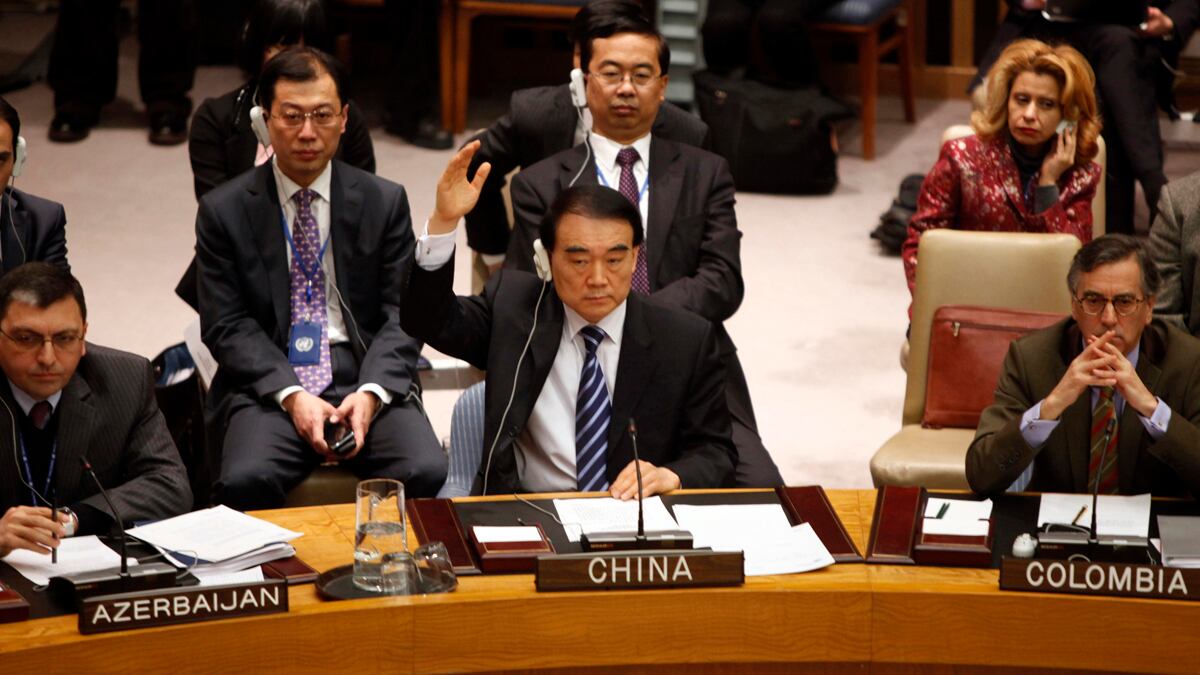Recent images from the embattled Syrian city of Homs, after nearly a week of shelling and more than 60 reported deaths, are hard to stomach: an anguished Syrian citizen pointed to dead and dying children with terrible wounds, shouting hoarsely, “Is this what the U.N. voted for?” Last week Russia and China had vetoed a key U.N. Security Council resolution that backed a new Arab League plan for a transition of power.
While Moscow’s close ties to Damascus—its weapons sales, the port it leases from Syria—are well-known, why did China go along with Russia? Beijing’s decision was made from a position of defensiveness, not of strength. China’s relationship with Syrian President Bashar al-Assad’s regime isn’t all that ironclad or important. But Beijing is paranoid about giving the West any leverage to topple autocratic regimes around the world (why else was there an Arab Spring, as Chinese leaders see it) or to compel them to kneel before Western standards of human rights. Beijing is tired of being pressured to follow rules set by the West.
Chinese strategists are painfully aware that much of the existing institutional architecture of the international community was built in the post–World War II era dominated by the U.S. and Western Europe. That meant isolated, socialist, impoverished China had little to do with the establishment of things such as currency regimes, the infrastructure of global trade, even global values systems and pop culture. That's why U.S. officials are always trying to make China feel—and act—like a “stakeholder” in the international order.
Today, Beijing feels that many of those old systems are outmoded, putting China at a disadvantage. In the wake of the global financial crisis in 2009, for example, China’s central bank proposed replacing the U.S. dollar as the international reserve currency, setting up in its place a new global system controlled by the International Monetary Fund. “The outbreak of the [current] crisis and its spillover to the entire world reflects the inherent vulnerabilities and systemic risks in the existing international monetary system,” stated People’s Bank of China governor Zhou Xiaochuan, in what was perceived as a startling broadside against the greenback.
Beijing wants to make sure the West doesn’t always get its way in the U.N., either. This helps explain why Chinese authorities expended valuable political capital to echo Moscow’s veto on Syria. Unlike Moscow, Beijing has been relatively low-key and circumspect in the use of its veto power; however two of eight vetoes cast by China in the Security Council have involved Syria (one in October 2011, blocking a sanctions resolution, and the second last week), leading to the perception of a Russia-China “axis of obstruction,” as Sinologist Minxin Pei's op-ed in The New York Times called it. Pei said the two countries are acting “to defy the West together, so that neither might look isolated.” (China’s other vetoes usually reflected national interests tied to significant allies at the time, such as Zimbabwe, Burma, and Bangladesh.)

China will pay a price. The recent veto on Syria undermines its campaign to project “soft power” and a kinder, gentler image around the world. However, the decision was based on visceral concerns. Ever mindful of what happened during the 1989 Tiananmen Square protest movement, Beijing officials are jittery about rising levels of domestic unrest today in China, especially on the eve of a delicate leadership transition at the top. The last thing they want is to set a precedent allowing outside governments to tinker with the internal affairs–and possibly foment regime change—in a nation wracked by dissent.
The issue of human-rights abuses has always bedeviled Beijing. Less than two weeks ago an editorial in the state-run China Daily lambasted an annual report by the U.S.-based NGO Human Rights Watch because it stated that Beijing’s human -rights situation is “deteriorating.” The commentary accused Human Rights Watch of trying to “conspire with some Western governments to achieve their political aims,” and attributed the report’s findings to prejudices rooted in “the West’s distorted perception of the socialist system, which deems China a threat and challenger to the West.”
Another hard-hitting editorial, this one in the English-language Global Times, which often reflects nationalistic views, accused some Americans of viewing the rise of China as a “zero-sum game” in which the U.S. could enhance its interests by bringing about “chaos” to undermine Beijing. The piece urged Washington to see that “the rise of China is not a sinister national political goal,” and concluded “it’s not easy to walk out of the shadow of the geopolitical competition of the past. But globalization is profoundly changing the rules and nature of competition between nations.” This time around, China aims to ensure it has a say in how those rules are made.




